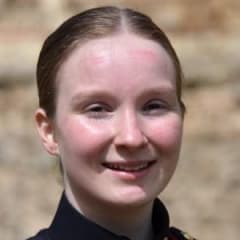Insider profil
Keen to receive questions about
Top Insider Advice
When going through selection for the Army, it can be very tempting to try and be the person you think they are looking for. That might work in the short term, but in the longer term, or when you are under pressure / tired / in command, that doesn't work. It is far better to be the person you really are, with your own quirks and personality, and to utilise your own skills and abilities. The Army can teach you how to lead and think tactically, it can develop your fitness and your endurance, it can't change how you start out as a person.
Career path
SO3 G1 (Pers)
British Army
From 09/2008 to 06/2024Company
What do you like about your job and the company?
I joined the Army because I wanted to give something back, to utilise my skill set in a way that I couldn't do in a civilian role. I'd been around the Armed Forces for years before I joined, and I knew the services were a family. Everyone watches out for each other, and strives towards team goals. There is a real sense of belonging, especially within tight-knit squadrons, or in the Officers' Mess. The Army also provides the opportunity to develop, not only military skills, but civilian and personal development as well. Coupled with sports and adventure training options, there is never a dull day.
Greatest achievements
As part of the work our Squadron undertakes, we regularly get asked for highly specific technical advice on projects and programmes that may be planned for years down the line, and which we can spend months working on for them. However, we sometimes get asked to advise on live operational taskings where we can see the outcomes of our advice in real-time, where we have minutes to provide output. These activities have the most impact on us. By occupying the 'thinking space' for commanders, it allows them to focus more on the 'tactical space' and, combined, that provides a huge advantage in the operational domain.
Amie P
Top Insider Advice
Someone once told me to never give up on something I was passionate about, but to find a way of making it happen. No matter how long it takes or how many push backs you get, if you are passionate about something, aim to succeed.
Caitlin B
Top Insider Advice
The army has countless opportunities for everyone , take as many as you can- whether that's professional development for your trade or working towards instructor qualifications for adventurous training, the list is endless. Enjoy as much of your career as possible and have a laugh with your friends around you. That way when you do decide to leave the army, you know you've had the best time possible.
Frank R
Top Insider Advice
It's always better to be at the bottom of a ladder you wan't to climb, than half way up one you don't. Okay... I promise I won't do anymore cheesy quotes from now on, but it really is true. I've always thought of this, as you can see from the various jobs I've had, I've always been looking for that one job that ticks every box for things you want out of a career. Don't be persuaded into doing a job you're not set on, just because it may result you getting your start date early. Or if you need a qualification for a particular job. Get that qualification! If it means you getting that career/job role that you really want, then go for it. Don't settle for second best.



